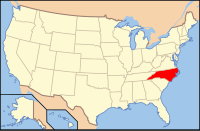Buncombe County
| Buncombe County, North Carolina | ||
|---|---|---|

Buncombe County Courthouse in Asheville
|
||
|
||
 Location in the U.S. state of North Carolina |
||
 North Carolina's location in the U.S. |
||
| Founded | 1791 | |
| Named for | Edward Buncombe | |
| Seat | Asheville | |
| Largest city | Asheville | |
| Area | ||
| • Total | 660 sq mi (1,709 km2) | |
| • Land | 657 sq mi (1,702 km2) | |
| • Water | 3.5 sq mi (9 km2), 0.5% | |
| Population | ||
| • (2010) | 238,318 | |
| • Density | 363/sq mi (140/km²) | |
| Congressional districts | 10th, 11th | |
| Time zone | Eastern: UTC-5/-4 | |
| Website | www |
|
Buncombe County is a county located in the U.S. state of North Carolina. As of the 2010 census, the population was 238,318. Its county seat is Asheville.
Buncombe County is part of the Asheville, NC Metropolitan Statistical Area.
The county was formed in 1791 from parts of Burke County and Rutherford County. It was named for Edward Buncombe, a colonel in the American Revolutionary War, who was captured at the Battle of Germantown. The large county originally extended to the Tennessee line. Many of the settlers were Baptists, and in 1807 the pastors of six churches including the revivalist Sion Blythe formed the French Broad Association of Baptist churches in the area.
In 1808 the western part of Buncombe County became Haywood County. In 1833 parts of Burke County and Buncombe County were combined to form Yancey County, and in 1838 the southern part of what was left of Buncombe County became Henderson County. In 1851 parts of Buncombe County and Yancey County were combined to form Madison County. Finally, in 1925 the Broad River township of McDowell County was transferred to Buncombe County.
In 1820, a U.S. Congressman, whose district included Buncombe County, unintentionally contributed a word to the English language. In the Sixteenth Congress, after lengthy debate on the Missouri Compromise, members of the House called for an immediate vote on that important question. Instead, Felix Walker rose to address his colleagues, insisting that his constituents expected him to make a speech "for Buncombe." It was later remarked that Walker's untimely and irrelevant oration was not just for Buncombe—it "was Buncombe." Thus, buncombe, afterwards spelled and then shortened to bunk, became a term for empty, nonsensical talk. This, in turn, is the etymology of the verb .
...
Wikipedia

